A generator provides energy in regions without access to electricity or acts as a backup power source during a power outage.
Since generators are a source of electricity, many people question if they must use surge protection with them.
The short answer is yes. Using a surge protector with a generator is essential for protecting your electrical devices from voltage spikes and surges. Doing so will ensure your electrical devices are safe and operate reliably.
Let’s learn more about surge protection and backup power supply and see a selection of top surge protectors for generators.
Surge Protection 101: What Is a Surge Protector?
A surge protector is a device that shields electronics from power surges.
A power spike is a sudden increase in electrical voltage that flows through an electrical circuit. They occur during lightning strikes, electrical outages, and issues with the power grid.
In addition, they cause damage to electronic devices, appliances, and electrical systems and may even ignite an electrical fire.
These devices work by diverting excess voltage from the connected equipment and grounding it. They typically consist of a metal oxide varistor (MOV) or gas discharge tube (GDT) that absorbs the excess voltage and directs it to the ground wire of the electrical system.
A surge protector is crucial for several reasons:
- Surge protectors safeguard delicate electronic equipment from electrical damage. They redirect excessive electricity away from the equipment, avoid harm, and extend its life.
- Surge protectors save you money. With these gadgets, the pricey fixes and replacements of broken devices and appliances will be reduced or eliminated.
- Surge protectors reduce the risk of electrical fires. Electrical fires are always a risk during massive power surges that overheat electrical equipment and damage the cables carrying the current.
- And last but not least, surge protection gives you peace of mind.
Backup Power Source 101: What Is a Generator?
Generators are backup power sources. They provide electricity during power outages or when power grids aren’t available.
A generator uses electromagnetic induction to create electricity, which involves rotating a wire coil inside the generator’s magnetic field to convert mechanical energy into electrical energy.
Because of electromagnetic induction, a generator’s power is less stable and more subject to fluctuations than a power grid. So, power spikes are very common with them.
Additionally, a generator can be impacted by external factors like temperature and humidity. These factors could disrupt its output power and harm electrical devices.
Surge protectors used in conjunction with generators help avoid such electrical harm. Additionally, they stabilize the generator’s voltage and ensure the frequency is reliable and safe.
What if I Don’t Use Surge Protection?
Having no shield of defense against electricity spikes has many downsides.
For starters, power surges will harm delicate electronic devices like laptops, TVs, and other gadgets. These shocks result in either instant harm, like a blown fuse or a burned-out component, or gradual damage, wearing out the devices’ electrical components faster.
Next, power spikes will overload the circuit and wires, leading to electrical fires. These flames can be especially hazardous if they go unnoticed or occur in locations that are difficult to access.
In addition, people nearby the surge are at risk. For instance, if a power surge happens while a person is using electrical equipment or machines, they are at risk of shocks or electrocution.
Finally, power surges also affect businesses because they may lead to lost income and reduced efficiency. These interruptions happen when spikes damage electrical equipment or if they cause power failures.
Types of Generators
There are many different generators on the market, including:
- Portable generators — lightweight, small machines that run on gasoline or diesel. They’re intended for outdoor gatherings or other situations where grid electricity is not accessible.
- Inverter generators are cutting-edge models that generate more reliable, steady electricity. These generators are quiet, more fuel-efficient, and smaller than conventional portable generators.
- Standby generators are permanent installations connected to a home’s electrical system. They’re designed to turn on when the power goes out automatically.
- Solar generators are powered by solar panels and provide clean and renewable energy. They’re portable and used in locations where grid power is not available.
- Diesel generators are large, powerful ones commonly used in industrial settings or commercial buildings. They’re powered by diesel and are capable of producing large amounts of electricity.
- Gasoline generators are similar to diesel generators but powered by gasoline. These generators are generally smaller and less potent than diesel ones.
Is a Surge Protector Necessary for All Kinds of Generators?
Yes, generally speaking, all devices powered on generators benefit from a surge protector. However, there are some instances where adding surge protection isn’t a must.
One such situation would be when hiking and bringing a small portable generator to power low-wattage appliances like smartphones or lamps. These devices generate less electricity and are less likely to disrupt the generator’s frequency and cause harmful power spikes.
Additionally, a backup generator with built-in safety features may not require a surge protector. A good example is standby generators hardwired directly into the electrical system. So to be on the safe side, it’s always a good idea to examine the manufacturer’s guidelines and see whether the generator has built-in surge protection.
The Best Surge Protectors for Generators
Are you looking for surge protectors for your generator? We have the best ones!
When selecting your model, there are a few key factors, such as the surge protector’s voltage rating, maximum surge current capacity, and the number of receptacles it has. Plus, the surge protector must be compatible with your generator’s electrical output.
The following five devices are some of the finest surge protectors for generators.
1. Tripp Lite Isobar Surge Protector
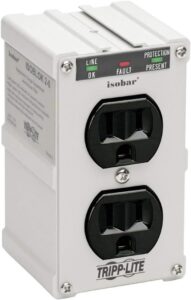
The Tripp Lite Isobar surge protector is a popular choice for those using portable generators that don’t power too many devices simultaneously. It has a voltage rating of 120V and a powerful surge capacity of 1410 joules. In addition, it features two outlets and a compact design, which makes it easy to transport.
2. APC P11VT3 Surge Protector
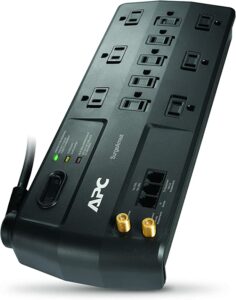
The APC SurgeArrest P11VT3 is a high-quality surge protector with 11 outlets,so it’s ideal for larger generators. It has a voltage rating of 120V and an incredibly powerful surge capacity of 3020 joules. It also features a built-in phone line splitter and coaxial ports, making it our list’s best multi-purpose surge protector.
3. CyberPower CP1500AVRLCD Surge Protector
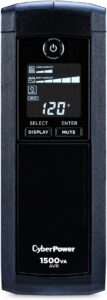
The CyberPower CP1500AVRLCD model is a smart device. It features a multifunction LCD intelligent panel, battery backup, surge protection, and data line protection.
Moreover, CyberPower has a powerful surge capability of 1500 joules and a voltage rating of 120V. It also offers receptacles for 12 outlets and a 6ft power cord. This surge protector is ideal for desktop computers, workstations, networking devices, home entertainment systems, and any other gadgets that are near one another or hold sensitive data.
4. Belkin Surge Protector
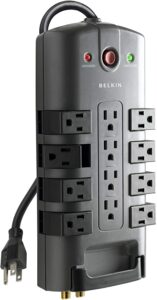
The Belkin surge protector is an excellent option if you want to protect powerful devices with large adapters. It has a voltage rating of 120V and a super powerful surge capacity of 4320 joules. It also features a unique design that allows the outlets to pivot, making it easy to accommodate larger power adapters.
5. Eaton CHSPT2ULTRA Ultimate Surge Protector
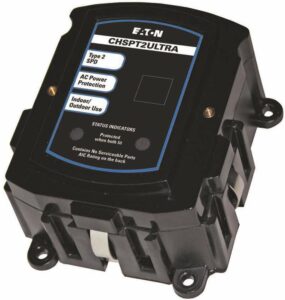
If you have a standby generator that lacks built-in surge protection, then this model is just for you. The Eaton CHSPT2ULTRA Ultimate is intended to safeguard your electrical gadgets to the greatest extent possible. It comes with a 120V voltage rating and a mighty surge rating of 108,000 joules! In addition, this universal model attaches to any manufacturer’s circuit, so it should also be compatible with most standby generators.
Conclusion
All things considered, a surge protector is a simple and cost-effective way to protect your valuable electronics from power surges and ensure they continue to function optimally.
A surge protector is not necessary for all generators, but it’s highly recommended, because their electrical power can vary in voltage and frequency, which sometimes causes power surges that can damage electronic devices and appliances.
When selecting a surge protector for your generator, consider factors such as its voltage rating, maximum surge capacity, the number of outlets, and the type of power cord it has.